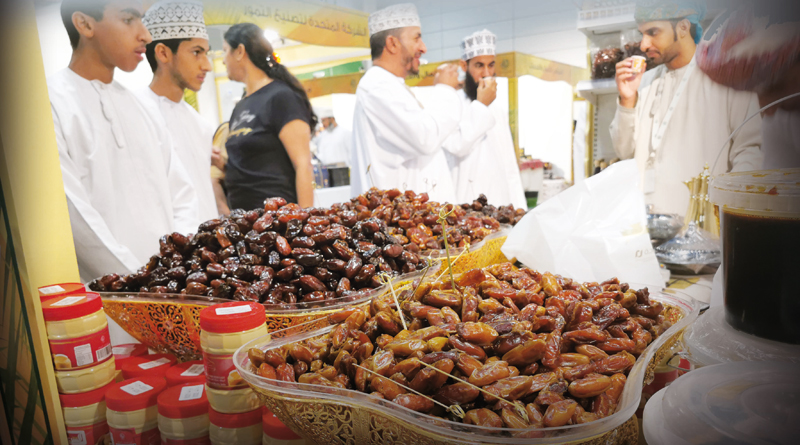

Omanis are known for their unique hospitality, and that particular tradition has unvaryingly attracted people and civilisations to this Arab world.
Visit any Omani house or office or a farm and be his guest, the first thing that they welcome you with is invariably the home-grown dates and traditionally brewed drink called ‘Kahwa’.






This sweet, fibre-rich, high in proteins and vitamins, small brownish (mostly) fruit is a common feature of the Arabin Gulf that lives with generations after generations, for Omanis, it is an emotion and an inevitable part of their day to day life.
While the abundant sunlight, the omnipresent oxygen that is vital to the living creatures are free, the plush, ubiquitous palm trees and dates are an Omani way of life and culture, Omanis are co-existing with.
The ongoing Oman Date Festival at the Oman Convention and Exhibition Centre is an ode to the effervescent dates culture of the Sultanate that showcases more than 250 indigenous varieties of dates, their derivatives, and their byproducts opening a large window to the history of these small fruits.
“Oman has a rich tradition of dates and palm trees, dates, date seasons, cultivation and preservation of the trees are a part and parcel of Omani life which cannot be separated from his very own self”, says Dr Saif bin Rashid al Shaqsi, Director General of the ‘One Million Date Palm Trees Project’, a national drive to preserve and protect, nourish dates culture in the country. This project oversees 11 locations spread across Al Dakhiliyah, Al Dhahirah, North Al Sharqiyah, South Al Sharqiyah, Al Buraimi, and Dhofar, with a projected date production of 96,000 tonnes and approximately 60,000 tons of date palm by-products annually.
Out of the various dates, the tastiest, delectable, and succulence ones for many are Fardh, Khalas, and Khunaizi. There are Nagal and Ash Patash varieties were among the first ones to hit the market. However, the acceptable to them are not as good as the earlier ones and dates of Al Khunaizi known as the sugariest will enter the market as harvest season progressed, thanks to the scorching heat that help dates to ripe and bow down in a natural attempt to help the pluckers reach easily, according to the elders who brought in their varieties of dates to the festival. These varieties are followed by Al Mebselli and Al Khasab date varieties. Besides Naghal, Faradh, Khalas, varieties like Bunaranja, Mmajdool, Hilali al Hassa, Barni, and Mathloob are also high in demand and have both local and international market. Al Shaqsi said that although all fruits are mid-season varieties, Majdool, originated from Morocco, is an expensive variety and boasts of high demand in European countries., Faradh is low in sugar, high in fibre and nutritious, Khalas can be seen in most of the Omani households.
“Dates in the Sultanate can be categorized into two groups, such as Table dates and Manufacturing dates “, adds Dr Saif bin Rashid al Shaqsi, who is also the Chairman of Nakheel Oman Development Company.
“While the Table dates are meant for human consumption, Manufacturing dates are not suitable for human consumption, hence, they are used as fodder for animals or by humans after processing.” Nakheel Oman Development Company is the flagship food processing and production company formed jointly by a partnership between the Diwan of Royal Court represented by Directorate of the One Million Date Palm Trees Project and Oman National Investments Development Company “Tanmia”. Set to become the Sultanate’s and one of the world’s largest date producers, Nakheel will manage all post-harvest activities for the date palm trees products and by-products.
Oman has an estimated 7.6 million palm trees and production of 360, 000 tonnes per year according to the Ministry of Agriculture and Fisheries’ statistics 2018. Oman’s dates production was estimated at 361,000 tonnes compared to 355,000 tonnes in 2016 and 344,000 tonnes in 2015. The Ministry has distributed nearly 750,000 seedlings to farmers in different parts of the Sultanate in the past to replace the old date palm trees besides introducing innovative packing and packaging units and distributing 750 packaging machines as part of this project. It has also provided subsidy to hundreds of farmers across the country and the ministry has also subsided more than 20 farmers who own date processing units.”
Oman Observer is now on the WhatsApp channel. Click here



